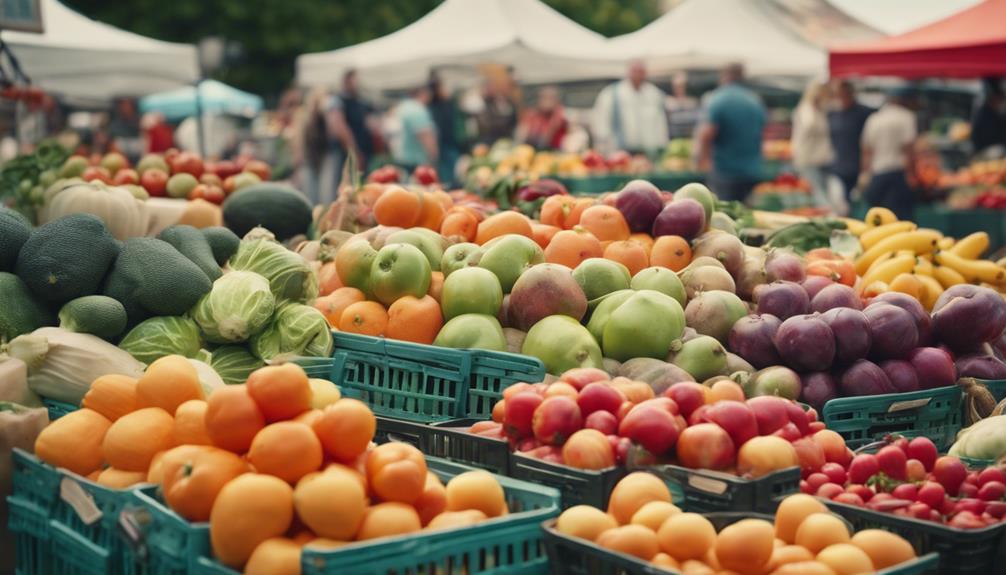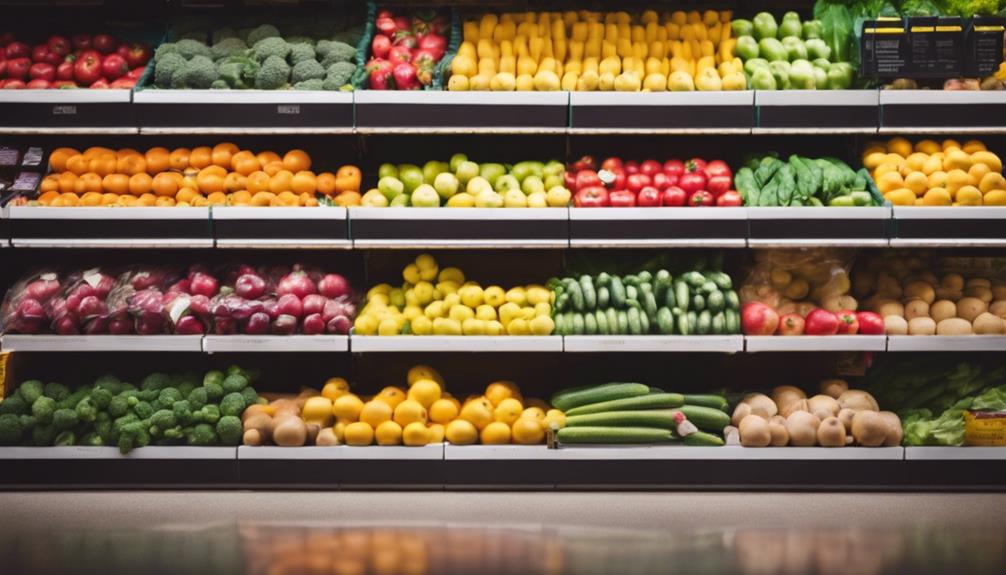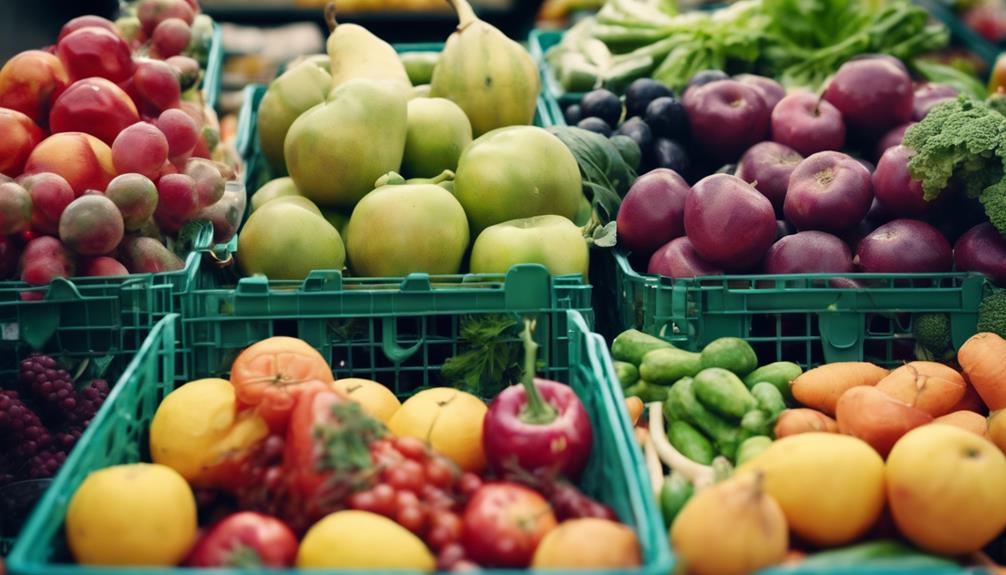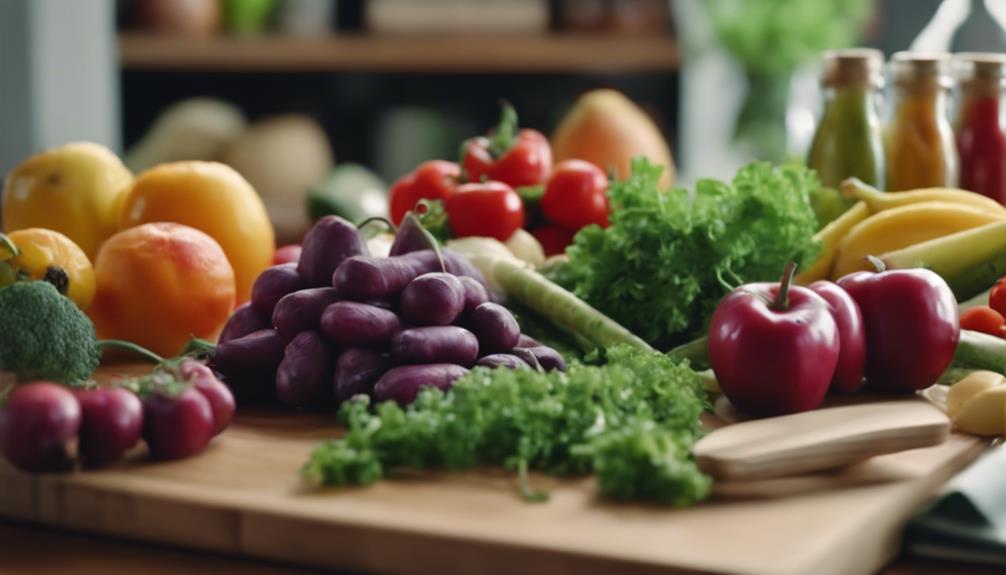Beginner's Guide to Organic Eating: Basics & Benefits
When it comes to navigating the world of organic eating, it can often feel like stepping into a whole new universe with its own set of rules and benefits. But fear not, as you begin to explore the basics, you'll uncover a world of knowledge that can transform the way you think about food and its impact on your health and the environment.
So, ready to embark on this journey towards a healthier and more sustainable lifestyle?
Key Takeaways
- Choose organic foods for higher nutrition, antioxidants, and support for sustainable farming.
- Look for USDA Organic seal or certified organic labels to ensure quality and environmental benefits.
- Organic farming reduces pesticides, promotes biodiversity, and protects the planet's health.
- Plan organic meals with seasonal produce, farmer's markets, and conscious meal prep for a healthier lifestyle.
What Is Organic Eating?
To understand organic eating, consider it as a lifestyle choice focused on consuming foods grown without synthetic pesticides or fertilizers. Organic farming methods prioritize sustainability and environmental protection by avoiding the use of harmful chemicals. By choosing organic foods, you support farmers who use practices that promote soil health, conserve water, and reduce pollution.
Organic food benefits extend beyond personal health to include the well-being of the planet. By opting for organic products, you reduce your exposure to potentially harmful substances while also supporting biodiversity and wildlife conservation. Organic farming methods often involve crop rotation, composting, and natural pest control, which contribute to healthier ecosystems.
Embracing organic eating means embracing a holistic approach to nutrition and sustainability. By understanding the principles of organic farming methods and the benefits of organic food, you empower yourself to make informed choices that align with your values and contribute to a healthier, more sustainable future.
Understanding Organic Certification
Understanding the process of organic certification provides consumers with assurance regarding the authenticity and quality of organic products. When it comes to organic foods, there are strict regulations that producers must adhere to in order to receive certification. These regulations ensure that organic products are grown, processed, and handled according to specific standards that promote sustainability and environmental health. Organic labeling restrictions also play a crucial role in maintaining the integrity of organic products by prohibiting the use of synthetic pesticides, GMOs, antibiotics, and growth hormones.
To give you a clearer picture, let's take a look at some key aspects of organic certification:
| Aspect | Description |
|---|---|
| Certification Process | Producers must undergo rigorous inspections and meet specific criteria to obtain certification. |
| Organic Standards | Products must meet strict guidelines regarding farming practices, soil health, and ingredient quality. |
| Labeling Requirements | Labels must accurately reflect the organic content of the product and cannot mislead consumers. |
| Compliance Monitoring | Ongoing checks ensure that certified producers continue to follow organic regulations. |
| Transparency | Consumers can trace the origin of organic products and understand how they were produced. |
Benefits of Organic Foods
Exploring the numerous benefits of organic foods reveals their impact on health and sustainability. Organic foods are cultivated through sustainable agriculture practices that prioritize soil and water conservation, reducing pollution, and promoting biodiversity. By choosing organic products, you not only support environmentally friendly farming methods but also contribute to the overall health of the planet.
One of the key advantages of organic foods is pesticide-free living. Conventional farming often involves the use of synthetic pesticides and herbicides, which can leave residues on produce and have potential health risks. Organic farming, on the other hand, prohibits the use of such chemicals, offering you a cleaner and safer option for consumption.
Opting for organic foods can also mean higher nutritional quality. Studies suggest that organic fruits and vegetables may contain more antioxidants and essential nutrients compared to their conventionally grown counterparts. By embracing organic eating, you not only prioritize your well-being but also support a more sustainable and eco-conscious food system.
Nutritional Value of Organic Produce
Enhancing your diet with organic produce can offer you a wealth of essential nutrients and beneficial antioxidants. Organic fruits and vegetables tend to have higher levels of certain vitamins, minerals, and antioxidants compared to conventionally grown produce. This is due to the farming practices used, which focus on soil health and biodiversity, leading to increased nutrient density in the crops.
The nutrient density of organic produce can provide you with a range of health benefits. For instance, organic fruits and vegetables are rich in vitamins such as vitamin C, vitamin E, and beta-carotene, which play crucial roles in supporting your immune system and overall health. Additionally, the antioxidants found in organic produce can help combat oxidative stress and reduce the risk of chronic diseases.
Environmental Impact of Organic Farming
Shifting towards organic farming practices not only benefits your health through nutrient-rich produce but also positively impacts the environment by reducing the use of synthetic pesticides and fertilizers. Organic farming embraces sustainable practices that prioritize the health of ecosystems.
By avoiding harmful chemicals, organic farms contribute to improved soil health. Synthetic pesticides can harm beneficial soil organisms, while organic methods promote biodiversity underground, enhancing soil structure and fertility. This approach nurtures the soil, making it more resilient to challenges like erosion and nutrient depletion.
Furthermore, organic farming helps in conserving water and reducing pollution by preventing chemicals from leaching into water sources. Sustainable practices such as crop rotation and composting are commonly employed in organic agriculture, further enhancing environmental sustainability.
Choosing organic products supports farmers who prioritize ethical and environmentally friendly practices, contributing to a more sustainable food system. By opting for organic foods, you aren't only benefiting your well-being but also actively participating in the preservation of our planet's health for future generations.
Organic Vs. Conventional Farming Practices
Comparing organic and conventional farming practices reveals key differences in methods and outcomes. Organic farming focuses on sustainability practices and prioritizes soil health, while conventional farming often relies on synthetic chemicals and pesticides. Here is a comparison table to highlight the distinctions between the two approaches:
| Aspect | Organic Farming | Conventional Farming |
|---|---|---|
| Pesticide Use | Limited use of natural pesticides and crop rotation | Relies heavily on synthetic chemical pesticides |
| Fertilizers | Relies on natural fertilizers like compost and manure | Uses synthetic fertilizers to boost crop production |
| Weed Control | Manages weeds through mulching and hand weeding | Controls weeds with herbicides and mechanical tilling |
| Soil Health | Focuses on building soil health through organic matter | Soil health may degrade due to chemical-intensive methods |
Understanding these differences can help you make informed choices about the food you consume. Organic practices support long-term sustainability and prioritize the health of both consumers and the environment by nurturing the soil and minimizing chemical inputs.
Common Misconceptions About Organic Food
Misconceptions about organic food often stem from a lack of understanding about the certification process and the actual benefits of choosing organic products. Consumer awareness plays a crucial role in debunking myths surrounding organic food.
One common misconception is that organic food is just a marketing tactic to sell products at higher prices. While it's true that organic products can sometimes be more expensive, this is mainly due to the higher cost of organic farming practices, not just for the sake of profit.
Another misconception is that organic food is always healthier than conventionally grown food. While organic food does have benefits like being free from synthetic pesticides and GMOs, it doesn't automatically mean it's more nutritious. The focus of organic farming is on sustainable practices rather than maximizing production, which can influence the nutrient content of the food.
How to Identify Organic Products
To ensure you're purchasing organic products, look for the USDA Organic seal on the packaging. This seal guarantees that the product has met the stringent organic standards set by the United States Department of Agriculture (USDA).
In addition to the USDA Organic seal, you can also look for other identifying labels on the packaging such as 'Certified Organic' or '100% Organic.' These labels indicate that the product has been certified by a third-party organization to meet organic standards.
When identifying organic products, it's essential to understand the organic standards that govern the production and labeling of organic foods. These standards prohibit the use of synthetic pesticides, genetically modified organisms (GMOs), and sewage sludge in organic farming. Organic farmers must also follow strict guidelines for animal welfare and soil health to maintain their organic certification.
Tips for Shopping Organic on a Budget
When shopping for organic products on a budget, prioritize purchasing seasonal produce to maximize cost savings while still enjoying the benefits of organic eating. Seasonal fruits and vegetables are often more abundant, leading to lower prices compared to out-of-season items. Look for local farmer's markets or community-supported agriculture (CSA) programs for budget-friendly options.
Buying in bulk or opting for frozen organic fruits and vegetables can also help save money. Additionally, consider meal prep strategies to make the most out of your organic purchases. Planning your meals in advance, cooking in batches, and utilizing leftovers creatively can help stretch your organic ingredients further.
Incorporating grains, legumes, and affordable organic proteins like eggs or tofu into your meals can also be cost-effective. By combining these budget-friendly options with smart meal prep strategies, you can enjoy organic eating without breaking the bank.
Organic Eating for Health and Wellness
For optimal health and wellness, incorporating organic foods into your diet can provide essential nutrients and reduce exposure to potentially harmful chemicals. Organic eating goes beyond just food; it's a lifestyle choice that can have a significant impact on your overall well-being. Here are some tips to help you embrace organic eating for health and wellness:
- Organic Meal Prep: Dedicate some time each week to prepare organic meals in advance. This can help you make healthier choices throughout the week and avoid reaching for processed foods.
- Organic Food Swaps: Replace conventional fruits and vegetables with organic options to reduce pesticide exposure. Consider swapping out items like organic milk, eggs, and meat for a more nutrient-dense alternative.
- Read Labels: When buying packaged organic foods, be sure to read labels carefully to ensure they meet your standards for organic certification.
- Shop Smart: Look for local farmer's markets or organic food co-ops to find fresh, organic produce at affordable prices. Prioritizing organic eating can lead to a healthier, more sustainable lifestyle.
Organic Meal Planning and Recipes
Dive into the world of organic meal planning and recipes to discover delicious and nutritious ways to incorporate organic foods into your daily routine. Meal prep becomes a breeze when you embrace organic ingredients. Start by selecting a variety of fresh produce, whole grains, lean proteins, and plant-based fats to create balanced meals. Sustainable cooking practices can further enhance your organic journey. Opt for locally sourced ingredients, reduce food waste by using leftovers creatively, and choose reusable containers for storage.
When planning your organic meals, think about incorporating a rainbow of fruits and vegetables to ensure a diverse range of nutrients. Experiment with different cooking methods like steaming, roasting, or stir-frying to keep things interesting. Try out new recipes that highlight the natural flavors of organic ingredients, such as salads with homemade dressings, hearty soups, and grain bowls packed with colorful veggies. By making conscious choices in your meal planning and cooking techniques, you can savor the benefits of organic eating while contributing to a more sustainable food system.
Transitioning to an Organic Lifestyle
To smoothly shift towards embracing an organic lifestyle, consider gradually introducing organic food choices into your daily meals and exploring sustainable cooking practices. Making small changes over time can help you transition more easily. Here are some tips to guide you through this process:
- Organic Swaps: Start by swapping out one conventional item for its organic counterpart, such as fruits, vegetables, or dairy products. This gradual shift can help you adjust to the taste and price differences of organic foods.
- Organic Meal Prep: Incorporate organic ingredients into your meal prep routine. Plan your meals ahead of time and use organic produce, grains, and proteins to ensure you have nutritious and delicious organic meals ready to enjoy throughout the week.
- Explore Farmer's Markets: Visit local farmer's markets to discover fresh, organic produce while supporting local farmers. This can be a fun way to explore new ingredients and connect with your community.
- Grow Your Own: Consider starting a small garden to grow your own organic herbs, fruits, or vegetables. This hands-on approach allows you to have complete control over the quality of your produce and can be a rewarding experience.
Frequently Asked Questions
Are There Any Specific Organic Foods That Can Help With Certain Health Conditions or Ailments?
Certain organic foods like turmeric for inflammation, ginger for digestion, and leafy greens for detoxification can aid specific health conditions. Tailoring your diet with these organic remedies can support your body's natural healing processes.
Can Organic Foods Help With Weight Loss or Weight Management?
Organic foods can aid in weight loss or management due to their higher nutrient content and lower pesticide levels compared to conventional options. Organic farming techniques prioritize soil health, resulting in more nutrient-rich produce.
How Can Organic Eating Impact a Person's Mental Health and Overall Well-Being?
Eating organic can positively impact your mental health and well-being by promoting mood stability and enhancing cognitive function. Organic foods are rich in nutrients that support gut health, contributing to a balanced and nourished mind and body.
Are There Any Ethical Considerations or Social Justice Aspects to Consider When Choosing Organic Foods?
When choosing organic foods, consider ethical sourcing and fair trade practices to support sustainability and social justice. Your decisions impact workers' rights, environmental preservation, and community well-being. Make informed choices for a better world.
Are There Any Potential Risks or Drawbacks to Consuming Organic Foods?
When considering potential risks or drawbacks to consuming organic foods, it's important to note that pesticide exposure is minimized due to stricter regulations. Additionally, organic farming practices often focus on environmental impact and sustainability, promoting healthier ecosystems.
Conclusion
As you embark on your organic eating journey, remember that choosing organic is like planting seeds of health and sustainability in your life.
By nourishing your body with organic foods, you're cultivating a garden of well-being that blossoms with each bite.
Stay curious, stay committed, and watch as the roots of your organic lifestyle deepen and flourish, creating a vibrant tapestry of vitality and harmony within you.
Happy eating!













